#Leopoldo Trieste
Text
A short clip with Marcello Mastroianni, Gian Maria Volonté and others in some of Elio Petri's movie where him is director or writer
@falsenote
#elio petri#marcello mastroianni#gian maria volonté#salvo randone#nino manfredi#franco nero#vanessa redgrave#leopoldo trieste#paolo panelli#toni ucci#le mani sporche#l'assassino#l'impiegato#a ciascuno il suo#indagine su un cittadino al di sopra di ogni sospetto#ipotesi sulla morte di giuseppe pinelli#la classe operaia va in paradiso#la decima vittima#i giorni contati#la proprietà non è più un furto#un tranquillo posto di campagna#todo modo
19 notes
·
View notes
Photo
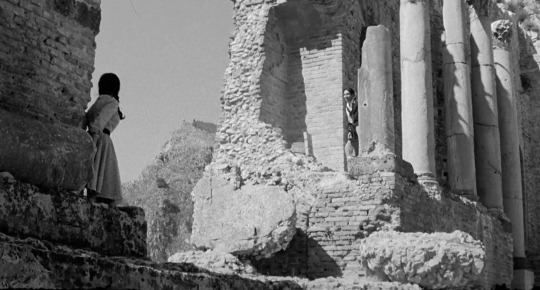

Divorzio all'italiana / Divorce Italian Style
Pietro Germi. 1961
Ruins
Teatro Antico di Taormina, Via del Teatro Greco, 1, 98039 Taormina ME, Italy
See in map
See in imdb
#pietro germi#divorzio all'italiana#divorce italian style#temple#taormina#ruins#daniela rocca#leopoldo trieste#movie#cinema#film#location#google maps#street view#1961
39 notes
·
View notes
Text
A Bay of Blood (1971)
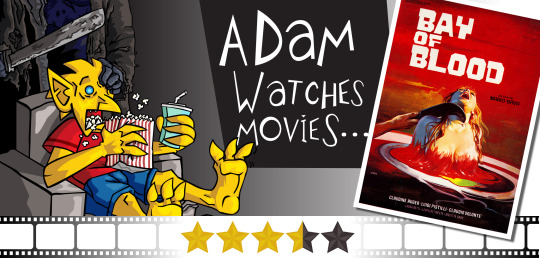
A Bay of Blood is probably more appealing to horror historians and/or Italian Giallo films than casual viewers. It isn’t quite a proper slasher film but you can see its influence upon the Friday the 13th and later entries in the Halloween franchise - some of the deaths we see here are recreated almost shot-for-shot in the latter. Though its pace is slower than it should be and there are too many characters to keep track of, its mystery is engaging and the body count shocks.
Wheelchair-bound Countess Federica Donati (Isa Miranda) is strangled to death by her husband Filippo Donati (Giovanni Nuvoletti). Moments later, he is himself murdered by an unseen assailant before hiding the body. In the morning, the police discover the dead countess but a note suggests she committed suicide. As the investigation continues, several people begin converging on the property either because they hope to inherit it or want to buy it from the new owners. With a mysterious killer on the loose and everyone’s greed running wild, the bodies begin piling up.
There are A LOT of characters in the film: real estate agent Franco Ventura (Chris Avram) and his lover Laura (Anna Maria Rosati), the creepy groundskeeper Simone (Claudio Volonté), an insect enthusiast named Paolo Fassati (Leopoldo Trieste) and his wife who cares nothing for him, Anna (Laura Betti), the countess’ daughter Renata (Claudine Auger) and her husband Alberto (Luigi Pistilli) as wekk as four teenagers who happen to be visiting the bay - Louise (Brigitte Skay), Sylvie (Paola Montenero), Luca (Guido Boccaccini) and Bobby (Roberto Bonanni). I’m sure someone could remember every face and all of their relationships without taking notes but I wasn’t. This is the kind of movie that needed to cast one Black guy, give someone else an eye patch, a third one some weird verbal tick, etc. Unless you already know how everyone relates, you’ll lose track. Further complicating things are your expectations going in. This is not the story of a lone madman picking off one person at a time for mysterious reasons. Nearly everyone in this story is a potential suspect because they’ve all got murderous urges and several people act upon them. We have all of these conspirators working independently, hoping to take ownership of the bay. In the middle of a scheme, someone will suddenly get decapitated because they're hindering someone else’s plan. Meanwhile, you’re still wondering who murdered Mr. Donati…
A Bay of Blood does an excellent job of keeping you guessing. From their first interaction, you don’t know if Simone and Paolo are potential suspects or just red herrings. Neither appear to have a motive for killing so it could be that if either one of them is a murderer there also happens to be a lunatic messing around with everyone else’s plans. This decision wouldn’t even come out of left field in this film. The teenagers are randomly there so why not?
Director Mario Bava does not give us a protagonist to latch onto. No character is “safe” until the very end. This further obscures the killer/killers’ identity/identities (let’s not assume only one person murdered Filippo) and makes it even more difficult to keep track of everyone. The gore (quite well executed considering the time and low budget) and sudden deaths are more than enough to keep you entertained but this is one of those instances where knowing a little bit about the plot going in would benefit viewers greatly. I can easily see some people getting frustrated by the opaque mystery and dismissing the whole thing. Back in the day, it would’ve been because of the (then) shocking amount of violence. Now, it might be because the ending comes out of nowhere. I have some affection for the final "twist", but it could’ve been foreshadowed better.
If A Bay of Blood interests you, I suggest you set aside an entire evening. Watch the movie, then read an online synopsis, then watch it again with some sort of commentary to "get it". I know that’s asking a lot. Too much for some people but if you are interested in learning the history of horror films, A Bay of Blood is an important stop along your journey and it’s worth doing right. Even if you just watch it once, you’ll still be engaged by the twisty plot, perplexed by the numerous red herrings, and shocked by its violence. (English dub, November 1, 2020)

#A Bay of Blood#movies#films#movie reviews#film reviews#Mario Bava#Giuseppe Zaccariello#Filippo Ottoni#Gene Luotto#Dardano Sacchetti#Franco Barberi#Claudine Auger#Luigi Pistilli#Claudio Volonte#Laura Betti#Leopoldo Trieste#Brigitte Skay#1971 movies#1971 films
5 notes
·
View notes
Text

The feels would have hit harder if Alfredo knew Elena had hidden the note and personally intervened to intercept the note, only to give it back to Toto, with his apologies, should Toto ever return.
Cinema Paradiso (Italian: Nuovo Cinema Paradiso) is a 1988 coming-of-age drama film written and directed by Giuseppe Tornatore. This Italian-French co-production stars Philippe Noiret, Jacques Perrin, Leopoldo Trieste, Marco Leonardi, Agnese Nano and Salvatore Cascio.
#cinema paradiso#nuovo cinema paradiso#italian#italy#coming of age#philippe noiret#jacques perrin#leopoldo trieste#marco leonardi#agnese nano#salvatore cascio#italian cinema#giuseppe tornatore#movie review#1988
4 notes
·
View notes
Photo
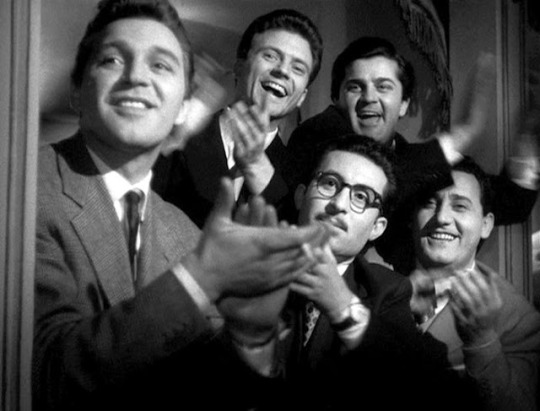
Franco Fabrizi, Franco Interlenghi, Leopoldo Trieste, Riccardo Fellini, and Alberto Sordi in I Vitelloni (Federico Fellini, 1953)
Cast: Franco Interlenghi, Alberto Sordi, Franco Fabrizi, Leopoldo Trieste, Riccardo Fellini, Leonora Ruffo, Jean Brochard, Achille Majeroni, Guido Martufi. Screenplay: Federico Fellini, Ennio Flaiano, Tullio Pinelli. Cinematography: Carlo Carlini, Otello Martelli, Luciano Trasati. Production design: Mario Chiari
Film editing: Rolando Benedetti. Music: Nino Rota.
The international success of I Vitelloni launched Federico Fellini's directing career after the comparative failures of Variety Lights (1951), which he co-directed with Alberto Lattuada, and The White Sheik (1952), his first solo directing effort. It also earned him an Oscar nomination for screenwriting, which he shared with Ennio Flaiano and Tullio Pinelli. It's certainly one of his most endearing early films, made before his familiar mannerisms set in -- though there are glimpses of those in the tawdry theatrical sequence with the grotesque aging actor played by Achille Majeroni (a part that Fellini tried to persuade Vittorio De Sica to play). But somehow it has taken me several viewings over the years to fully appreciate it. I think that's because Fellini's greatest films have a strong central character -- usually played by Giulietta Masini or Marcello Mastroianni -- to hold the narrative together. I Vitelloni is by definition and title an ensemble picture, but it's also the first of Fellini's excursions into himself, concluding with the Fellini surrogate, Moraldo Rubini (Franco Interlenghi) boarding a train that will take him away from the idlers of his provincial home town -- and presumably to Rome, where he will become the jaded Marcello Rubini of La Dolce Vita (1960) and the blocked director Guido Anselmi of 8 1/2 (1963). The problem is that the character of Moraldo isn't written strongly enough or given enough substance by the actor: Interlenghi, who was discovered by Roberto Rossellini and cast in Shoeshine (1946), had a long career in films and TV in Italy, but the part in I Vitelloni demands someone with more charisma -- a young Mastroianni, in short. Moraldo is overshadowed by the womanizing Fausto (Franco Fabrizi) and by the comic figures of Alberto (Alberto Sordi) and Leopoldo (Leopoldo Trieste). The scenes that should develop Moraldo as a central figure don't quite work, particularly the early-morning encounters with Guido (Guido Martufi), a boy on his way to work at the railroad station -- a sharp counterpoint to the idling vitelloni. "Are you happy?" Moraldo asks the boy. "Why not?" he replies. The exchange seems designed to undercut the frenetic strivings and complaints of the vitelloni, who chafe against the boredom and provinciality of the town, but don't seem to be able to muster enough resolve to do something about it, instead continuing to pursue phantoms of creative or sexual success. The trouble with the Moraldo-Guido scenes is that they come out of nowhere narratively -- and even have oddly uncomfortable (and probably unintended) hints of pedophilia on Moraldo's part. Nor do they satisfactorily set up the film's ending: Moraldo departs and we see Guido walking along the train tracks, the former facing up to the uncertain future, the latter heading comfortably back into his routine. Still, it's a film held together by the score by Fellini's great collaborator Nino Rota, and filled with the boundless energy that often rescued Fellini from his worst impulses.
#I Vitelloni#Federico Fellini#Franco Fabrizi#Franco Interlenghi#Leopoldo Trieste#Riccardo Fellini#Alberto Sordi
2 notes
·
View notes
Photo
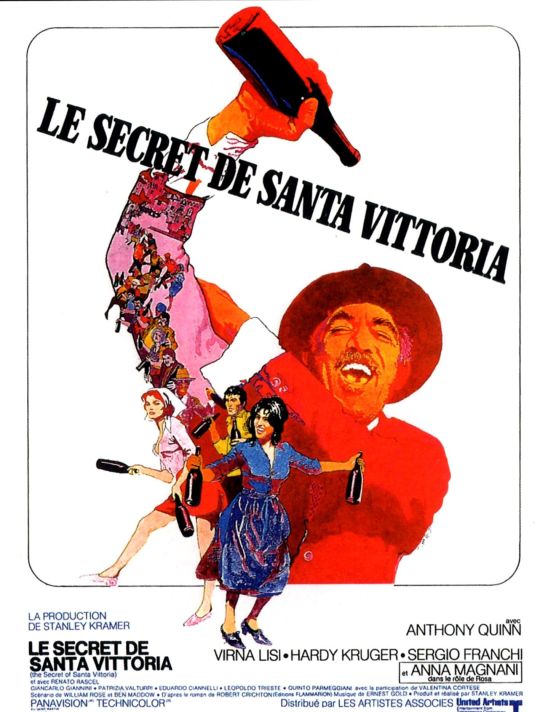
#the secret of santa vittoria#anthony quinn#virna lisi#hardy krüger#sergio franchi#anna magnani#renato rascel#giancarlo giannini#patrizia valturri#eduardo ciannelli#leopoldo trieste#quinto parmeggiani#stanley kramer#1969
6 notes
·
View notes
Text

#poster#philippe noiret#salvatore cascio#marco leonardi#agnese nano#jacques perrin#leopoldo trieste#isa danieli#enzo cannavale#pupella maggio#leo gullotta#brigitte fossey#antonella attili#Nicola Di Pinto#Tano Cimarosa#cinema paradiso#1980s#Giuseppe Tornatore#Blasco Giurato
0 notes
Text
25 gennaio … ricordiamo …
25 gennaio … ricordiamo …
#semprevivineiricordi #nomidaricordare #personaggiimportanti #perfettamentechic
2020: Narciso Parigi, cantante e attore italiano. (n. 1927)
2017: Mary Tyler Moore, attrice statunitense. (n. 1936)
2017: John Hurt, Sir John Vincent Hurt, è stato un attore britannico, tra i più noti e ambiti attori inglesi nel mondo del cinema e del teatro, apprezzato anche per i suoi numerosi ruoli teatrali in opere shakespeariane. (n. 1940)
2003: Leopoldo Trieste, è stato un attore,…

View On WordPress
#25 gennaio#25 gennaio morti#Adele Astaire#Adele Marie Austerlitz#Ava Gardner#Ava Lavinia Gardner#Colleen Moore#Irene Castle#Irene Foote#John Hurt#Kathleen Morrison#Leopoldo Trieste#Marion Sunshine#Mary Tunstal Ijames#Mary Tyler Moore#Morti 25 gennaio#Morti oggi#Narciso Parigi#Richard Archer Prince#Ricordando ..#Ricordiamo#Sir John Vincent Hurt#William Tubbs
0 notes
Text
Don't Look Now (1973) Review
Don’t Look Now (1973) Review
Laura and John Baxter are a married couple who are grieving the death of their young daughter Catherine after a tragic accident are in Venice when they encounter a very strange pair of elderly sisters with one claiming to be psychic and brings a warning from the beyond!
⭐️⭐️⭐️
(more…)

View On WordPress
#1973#Adelina Poerio#Allan Scott#Ann Rye#BBC iPlayer#Bruno Cattaneo#Chris Bryant#Cleila Matania#Daphne Du Maurier#David Tree#Don&039;t Look Now#Donald Sutherland#Drama#Giorgio Trestini#Hilary Mason#Horror#Julie Christie#Leopoldo Trieste#Massimo Serato#Mystery#Nicholas Salter#Nicolas Roeg#Renato Scarpa#Review#Sharon Williams
0 notes
Text

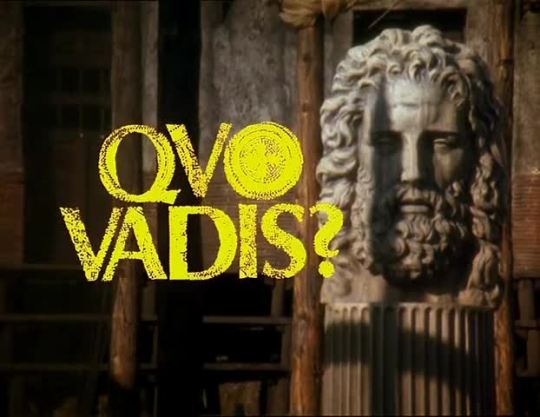
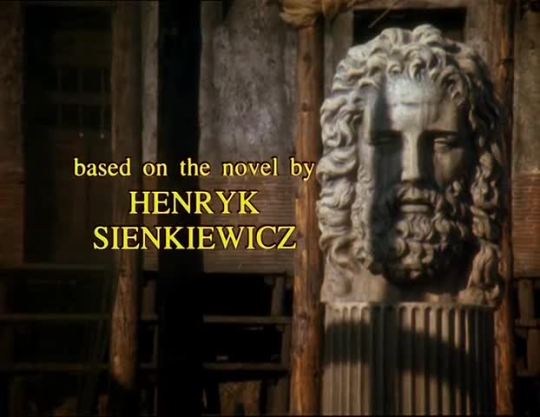
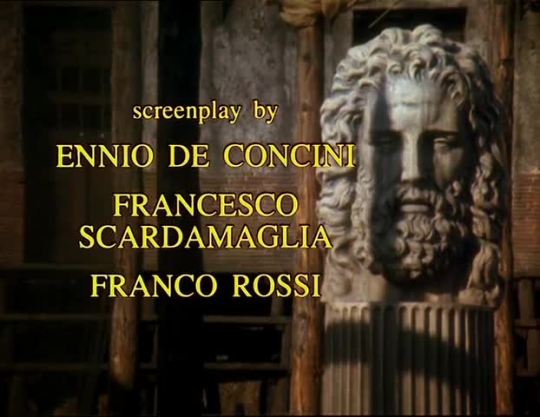


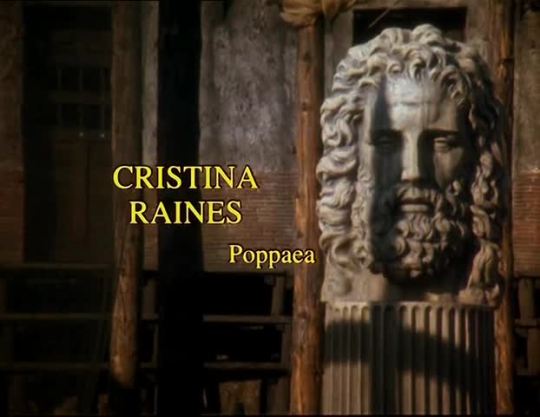


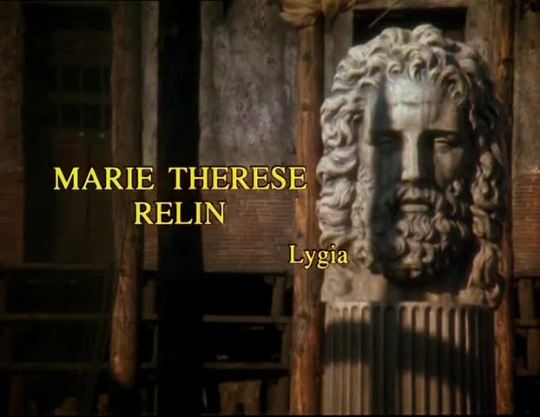



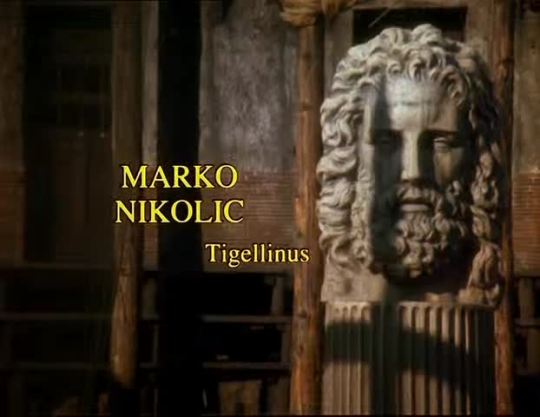
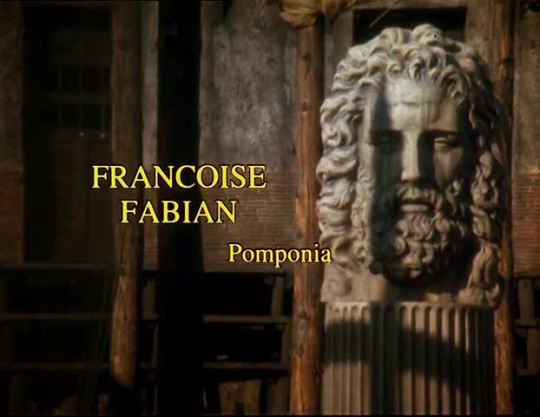
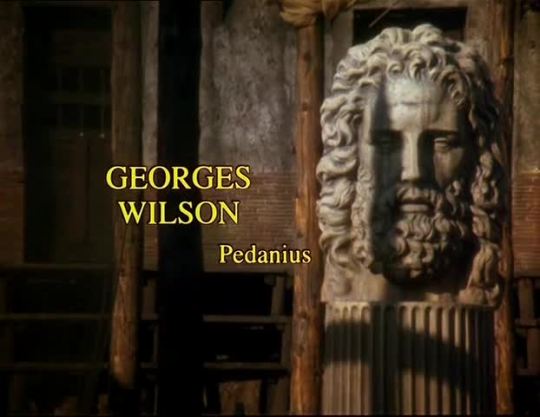
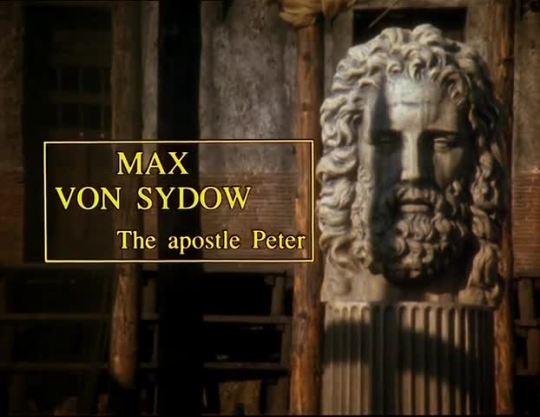

Quo Vadis? - RAI 1 - February 24, 1985 - March 24, 1985
Period Drama (6 episodes)
Running Time: 60 minutes
Stars:
Klaus Maria Brandauer as Nero
Frederic Forrest as Petronius
Cristina Raines as Poppaea
Barbara De Rossi as Eunice
Francesco Quinn as Marcus Vinicius
Max von Sydow as The Apostle Peter
Marie-Theres Relin as Licya
Gabriele Ferzetti as Piso
Ángela Molina as Acte
Massimo Girotti as Aulus Plauzius
Françoise Fabian as Pomponia
Philippe Leroy as Paul of Tarsus
Leopoldo Trieste as Chilo
Olga Karlatos as Epicaris
Marko Nikolic as Tigellinus
Georges Wilson as Pedanius
Marisa Solinas as Polybia
Annie Belle as Myriam
Valerija Brkljač as Epafrodito
Radomir Kovačević as Ursus
#Quo Vadis?#TV#RAI 1#1985#Period Drama#Klaus Maria Brandnauer#Frederic Forrester#Christina Raines#Barbara De Rossi#Francesco Quinn#Max Von Sydow
2 notes
·
View notes
Text
Presentata al Salone degli Incanti l'evento "Hausbrandt e Trieste. Cultura e commerci mitteleuropei 1892 - 2023"

Presentata al Salone degli Incanti l'evento "Hausbrandt e Trieste. Cultura e commerci mitteleuropei 1892 - 2023".
Trieste, una storia lunga oltre 130 anni, intrecciata al percorso di crescita dell'Italia, ai mutamenti di gusti, stili e riti della società, e sempre profondamente legata alla città di origine: a quella cultura mitteleuropea, quel crocevia di popoli, religioni e saperi che Trieste, città del caffè per eccellenza, tutt'oggi rappresenta.
"Hausbrandt e Trieste. Cultura e commerci mitteleuropei 1892 - 2023" è l'evento/kermesse promosso dalla Fondazione Hausbrandt, con la coorganizzazione del Comune di Trieste, il Patrocinio della Regione Friuli Venezia Giulia e della città di Treviso, che dal 9 settembre al 22 ottobre animerà il Salone degli Incanti, nella città Giuliana, con l'intento di ricostruire il lungo, straordinario percorso del famoso marchio del caffè presente in 90 Paesi del mondo.
Alla presentazione al Salone degli Incanti sono intervenuti l'assessore alla Cultura del Comune di Trieste Giorgio Rossi, il presidente FondazioneHausbrandtTrieste1892 PrivatStiffung Martino Zanetti, l'architetto, curatore della mostra e dell'allestimento Luciano Setten e la DesignFestival, curatrice dei talks Paola Bellin.
Ricordando il feeling immediato e totale di Martino Zanetti con la città di Trieste, l'assessore alla Cultura Giorgio Rossi ha tra l'altro evidenziato come " dietro a questa mostra c'è la passione di Martino, che è un esempio di chi testimonia la parola amore per Trieste, per la propria città e per la propria storia. Un amore soprattutto per quelli che verranno dopo. Perché vedete, c'è una cosa di cui non riusciamo a liberarci: il voler ottenere risultati subito, il voler essere apprezzati per quello che facciamo e abbiamo costruito nel nostro passato e vorremmo costruire nel nostro futuro. Ma c'è qualcosa che supera questo: il voler realizzare, lavorare e fare per gli altri senza pretendere poi di essere di essere protagonisti assoluti. Questa è la differenza tra gli uomini e i geni, tra chi è superbo e chi è umile. Oggi la figura di Marino Zanetti mi ha molto colpito, perché è entrato in questo spirito e ha seminato quei fiori, quei campi e quei profumi che Trieste merita, in questa nuova centralità dove si realizza realizza un'utopia verso quel futuro che le nuove generazioni sapranno apprezzare e vivere anche attraverso il nostro comune lavoro".
L'evento, fortemente voluto dal Comune di Trieste e accolto da Martino Zanetti, Presidente della Fondazione Hausbrandt, vuole valorizzare e celebrare la stretta relazione tra la città e l'azienda. L'importanza dell'evento è sottolineata anche dalla presenza al vernissage assicurata dai Presidenti delle Associazioni Industriali mitteleuropee. A rappresentare l'Austria sarà Markus D'Asburgo, amico fraterno della famiglia di Martino Zanetti. La loro partecipazione assume grande rilevanza in quanto Hausbrandt Trieste 1892, decana dell'industria europea, ha voluto dedicare questa mostra e lo sforzo per organizzarla alla città di Trieste ma anche alla crescente condivisione degli industriali mitteleuropei della volontà di pace, unico contesto nel quale può prosperare la civiltà. La curatela dell'evento "Hausbrandt e Trieste. Cultura e commerci mitteleuropei 1892 – 2023", che sarà animato da talks e concerti, è stata affidata all'arch. Luciano Setten.
Un brand divenuto, da quel lontano 1892, un'icona famigliare riconosciuta nell'immaginario collettivo, grazie anche alle scelte grafiche, alla corporate image creata da grandi artisti del Novecento e ad alcune soluzioni comunicative, a tratti rivoluzionarie, con cui Hausbrandt ha saputo innovare,nel cruciale scorrere del cosiddetto secolo breve e tutt'oggi, il marketing e la pubblicità.
Grandi personalità, come quella del pittore e cartellonista Leopoldo Metlicovitz, dei pubblicitari Luciano Biban e Robilant e dello studio Demner Merlicek & Bergmann, saranno tra i protagonisti di questo racconto che, nel mentre, darà conto anche della Trieste del tempo e renderà evidente il passare delle mode.
Nella città che ha fatto la storia del caffè e dei caffè, quali luoghi carismatici e palpitanti di connessioni culturali, ecco dunque un intenso percorso - attraverso immagini storiche, oggetti di design e industriali, bozzetti, grafiche, loghi, materiali d'archivio - per scoprire i nodi del successo d'immagine di questo marchio ultracentenario, rappresentativo di una delle eccellenze italiane: immagine preservata e valorizzata anche nel recente corso dell'azienda da Martino Zanetti.
"Hausbrandt e Trieste. Cultura e commerci mitteleuropei 1892 – 2023" sarà aperta gratuitamente al pubblico da sabato 9 settembre fino al 22 ottobre. Feriali 11.00 – 19.00, sabato e festivi 11.00- 21.00. Chiuso il martedì. Informazioni mostra e talks a questo link....
#notizie #news #breakingnews #cronaca #politica #eventi #sport #moda
Read the full article
0 notes
Text
Octobre MMXXII
Films
Les Acteurs (1999) de Bertrand Blier avec André Dussollier, Jacques François, Sami Frey, Jean-Pierre Marielle, Michel Piccoli, Claude Rich et Josiane Balasko
Histoire vraie (1973) de Claude Santelli avec Pierre Mondy, Marie-Christine Barrault, Denise Gence, Claude Brosset, Isabelle Huppert et Danielle Chinsky
Le Passager de la pluie (1970) de René Clément avec Marlène Jobert, Charles Bronson, Annie Cordy, Jill Ireland, Ellen Bahl et Steve Eckhardt
Les hommes préfèrent les blondes (Gentlemen Prefer Blondes) (1953) de Howard Hawks avec Jane Russell, Marilyn Monroe, Charles Coburn, Tommy Noonan et Elliott Reid
De l'or en barres (The Lavender Hill Mob) (1951) de Charles Crichton avec Alec Guinness, Stanley Holloway, Sydney James, Alfie Bass, Marjorie Fielding et Audrey Hepburn
La Gueule de l'autre (1979) de Pierre Tchernia avec Michel Serrault, Andréa Parisy, Jean Poiret, Bernadette Lafont, Curd Jügen, Roger Carel et Georges Géret
Invasion of the Body Snatchers (1956) de Don Siegel avec Kevin McCarthy, Dana Wynter, King Donovan, Carolyn Jones et Larry Gates
Simone, le voyage du siècle (2022) d'Olivier Dahan avec Elsa Zylberstein, Rebecca Marder, Élodie Bouchez, Judith Chemla, Olivier Gourmet, Mathieu Spinosi et Sylvie Testud
Adieu l'ami (1968) de Jean Herman avec Alain Delon, Charles Bronson, Olga Georges-Picot, Brigitte Fossey, Bernard Fresson et Jean-Claude Balard
Itinéraire d'un enfant gâté (1988) de Claude Lelouch avec Jean-Paul Belmondo, Richard Anconina, Marie-Sophie L., Jean-Philippe Chatrier, Lio, Daniel Gélin et Béatrice Agenin
Joyeuses Pâques (1984) de Georges Lautner avec Jean-Paul Belmondo, Sophie Marceau, Marie Laforêt, Rosy Varte et Michel Beaune
À bout portant (The Killers) (1964) de Don Siegel avec Lee Marvin, Angie Dickinson, John Cassavetes, Clu Gulager, Claude Akins, Norman Fell et Ronald Reagan
Détective Conan : Le Gratte-Ciel infernal (Meitantei Konan: Tokei shikake no matenrō) (1997) de Kenji Kodama avec Claudine Grémy, Philippe Valmont, Nayeli Forest, Gérard Malabat et Cyrille Monge
Les Guignols de l'info : La Fiction (1999) de Bruno Le Jean avec Yves Lecoq, Daniel Herzog, Sandrine Alexi, Nicolas Canteloup, Joël Demarty et François Jerosme
Les Trois Jours du Condor (Three Days of the Condor) (1975) de Sydney Pollack avec Robert Redford, Faye Dunaway, Cliff Robertson, Max von Sydow, John Houseman et Addison Powell
Le Bruit des glaçons (2010) de Bertrand Blier avec Jean Dujardin, Albert Dupontel, Anne Alvaro, Myriam Boyer, Christa Theret et Audrey Dana
Burn After Reading (2008) de Joel et Ethan Coen avec George Clooney, Frances McDormand, Brad Pitt, John Malkovich, Tilda Swinton et Richard Jenkins
Antoinette dans les Cévennes (2020) de Caroline Vignal avec Laure Calamy, Benjamin Lavernhe, Olivia Côte, Louise Vidal, Marc Fraize, Jean-Pierre Martins et Lucia Sanchez
La Soif du mal (Touch of Evil) (1998) d'Orson Welles avec Charlton Heston, Janet Leigh, Orson Welles, Akim Tamiroff, Joseph Calleia et Marlene Dietrich
Cinema Paradiso (Nuovo Cinema Paradiso) (1988) de Giuseppe Tornatore avec Philippe Noiret, Salvatore Cascio, Marco Leonardi, Jacques Perrin et Leopoldo Trieste
Séries
Doctor Who Series 13
Survivants du flux - Les conquérants - The Power Of The Doctor
Le Coffre à Catch
#84 : Chavo et CM Punk c'est la bagarre!! - #85 : Kelly Kelly fait du bon catch : Info ou Intox? - #86 : Le Nature Boy de passage à la ECW ! - #87 : Le meilleur Triple Threat de la ECW ?
Affaires sensibles
Qui a peur de Belphégor ? - 1984, George Orwell - Épisode 1/2 : L'affaire Dreyfus : au fond de la corbeille - Épisode 2/2 : L'affaire Dreyfus : l'innocent le plus célèbre de France - Farewell : l'espion qui a fait basculer la guerre froide - L'OVNI de Roswell et le mystère de la Zone 51 - L'Exorciste de William Friedkin, Belzébuth superstar - Le fantôme du château de Veauce
Graffiti 80
Le premier salon du changement (1981-1983) - Coulez le Rainbow Warrior (1984-1985) - Touche pas à mon poste (1986-1987) - A l'Est du nouveau (1988-1989)
Rex, Chien Flic Saison 5, 6, 7, 8
Le testament - Secrets fatals - Sissi - Série noire - Le secret des cartes - Le brésilien - Le faux coupable - Le cheval qui valait des millions - Plein gaz - Clichés tragiques - Héritage empoisonné - Mauvaises actions - À la dernière seconde - On n'embrasse pas les policiers - Et la mort frappa deux fois - Le petit chien - Hold-up - Œil pour œil - Les cachets
Dark Side of The Ring Saison 3
Le Procès des stéroïdes
Brooklyn Nine Nine Saison 1, 2, 3, 4, 5
Halloween - Halloween II - Halloween III - Halloween IV - Halloween V
Spectacles
L'Exoconférence (2014) d'Alexandre Astier
Livres
Des rives humaines de Delphine Evano
Bilbo le Hobbit de J.R.R. Tolkien
(III) et tes soupirs entre les draps de Celle qui aimait
Kaamelott Tome 8 : L'antre du Basilic de Alexandre Astier et Steven Dupré
Détective Conan : Tome 2 de Gôshô Aoyama
Marvel, les années 2000 : Tome 3 : Black Widow de Scott Hampton et Devin Grayson
Contes et légendes mythologiques de Emile Genest
Hitchcock présente : Histoires angoissantes
1 note
·
View note
Photo
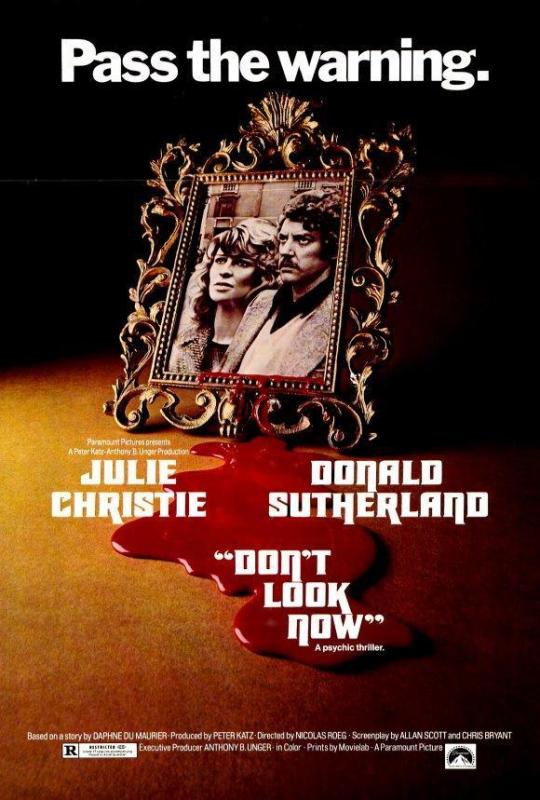
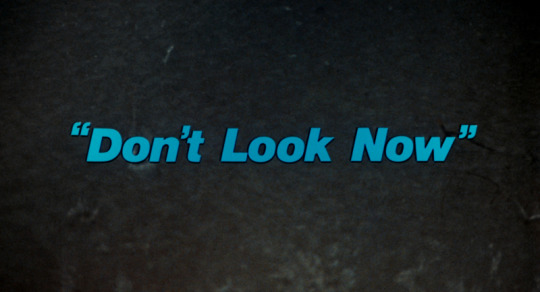
CALIFICACIÓN PERSONAL: 6 / 10
Título Original: Don't Look Now
Año: 1973
Duración: 110 min
País: Reino Unido
Director: Nicolas Roeg
Guion: Allan Scott, Chris Bryant. Historia: Daphne Du Maurier
Música: Pino Donaggio
Fotografía: Anthony B. Richmond
Reparto: Donald Sutherland, Julie Christie, Hilary Mason, Renato Scarpa, Massimo Serato, Clelia Matania, Leopoldo Trieste, Ann Rye, Sharon Williams
Productora: Coproducción Reino Unido-Italia; Paramount Pictures
Género: Drama, Horror, Mistery
https://www.imdb.com/title/tt0069995/
TRAILER:
youtube
1 note
·
View note
Text
4. El Padrino II
Año: 1974.
Titulo original: The Godfather Part II.
Síntesis: Es la juventud de Vito Corleone en Nueva York, 1920, mientras su hijo expande el control del imperio delictivo.
Es la cuarta película mejor calificada de IMDb con 9/10 puntos.
Premios: Ganó 6 premios Óscar, en total 17 premios ganados y 20 nominaciones.
Elenco principal: Al Pacino, Robert de Niro, Robert Duvall, Diane Keaton, John Cazale, Talia Shire, Lee Strasberg, Michael Gazzo, G.D. Spradlin, Richard Bright, Gastone Moschin, Tom Rosqui, Bruno Kirby, Frank Sivero, Francesca de Sapio, Morgana King, Marianna Hill, Leopoldo Trieste.
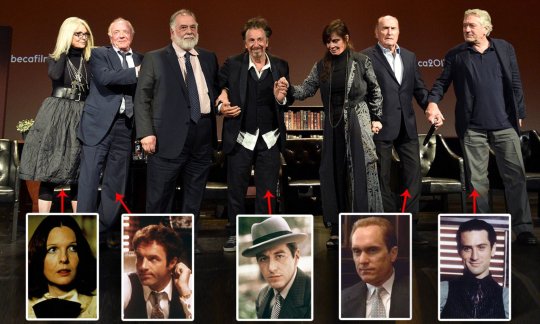
Elenco principal y director al momento de la realización de la película y actualmente.
Director: Francis Ford Coppola.
Guionistas: Francis Ford Coppola, Mario Puzo.
Género: Crimen, Drama.
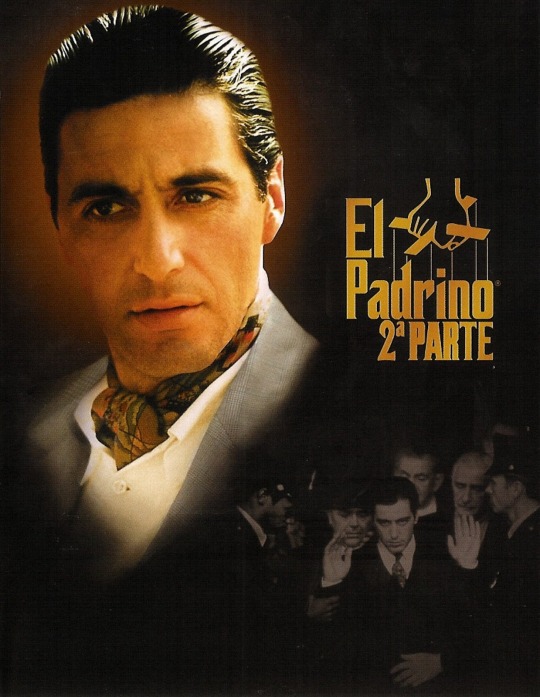
0 notes
Text

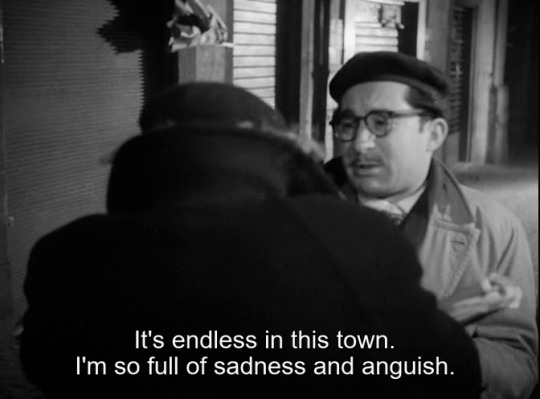

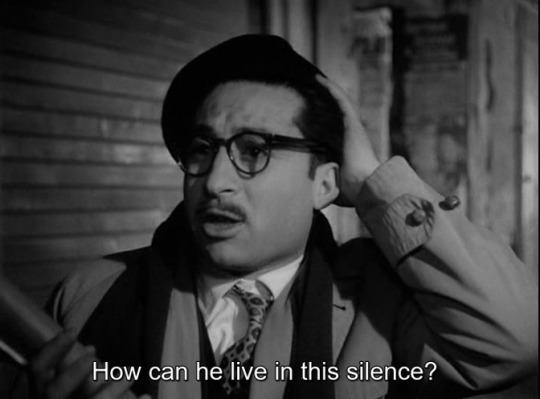


I Vitelloni (1953) - dir. Federico Fellini
27 notes
·
View notes
Photo
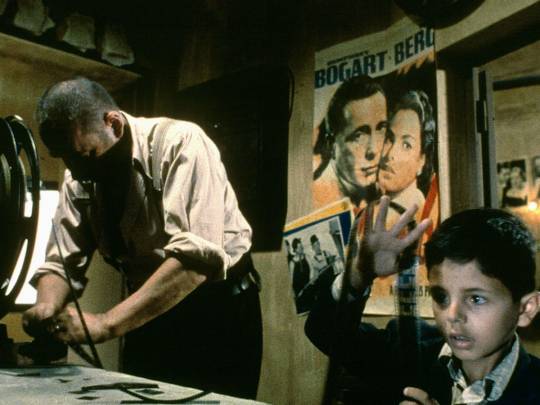
Philippe Noiret and Salvatore Cascio in Cinema Paradiso (Giuseppe Tornatore, 1988)
Cast: Philippe Noiret, Salvatore Cascio, Marco Leonardi, Jacques Perrin, Agnese Nano, Antonella Atti, Enzo Cannavale, Isa Danieli, Leopoldo Trieste, Roberta Lena, Nino Terzo, Leo Gullotta, Tano Cimarosa, Nicola Di Pinto. Screenplay: Giuseppe Tornatore, Vanna Paoli. Cinematography: Blasco Giurato. Production design: Andrea Crisanti. Film editing: Mario Morra. Music: Ennio Morricone.
Will today's kids feel sentimental about the multiplexes in which they see movies, the way I feel about the small-town theaters where I grew up, the places where I learned to love movies? I have my own lost cinema paradises, so I should be the right audience for Cinema Paradiso, with its tribute to a bygone era of moviegoing. Tornatore's movie has some good things going on, including the performance of Philippe Noiret as Alfredo, and the wonderful rapport between Noiret and young Salvatore Cascio as Toto. Leopoldo Trieste's performance as the censorious Father Adelfio is also a delight, and ending the film with Alfredo's assemblage of the kissing scenes the priest made him excise is a masterly bit. But once Toto grows up to be the lovestruck teenager Salvatore (Marco Leonardi), I begin to lose interest, as Tornatore's screenplay lards on more and more sentimentality. I've seen the 155-minute version twice now, though I have yet to see the 173-minute "director's cut" of the film, in which, I am told, the grownup Salvatore (Jacques Perrin) is reunited with his teen love Elena (Agnese Nano), now grown up and played by Brigitte Fossey. Frankly, I don't much want to: The 155-minute version seems overlong as it is. Cinema Paradiso is beloved by many, and often makes lists of people's favorite foreign-language films, but I find it thin and conventional.
4 notes
·
View notes